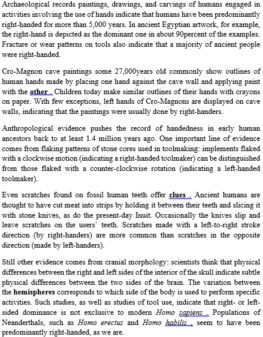Read the following passage and mark the letter A, B, C, or D on your answer sheet to indicate the correct answer to each of the questions from 35 to 42.
In this modern world where closed-circuit television (CCTV) cameras are everywhere and smartphones in every pocket, the routine filming of everyday life is becoming pervasive. A number of countries are rolling out body cams for police officers; other public-facing agencies such as schools, councils and hospitals are also experimenting with cameras for their employees. Private citizens are getting in on the act too: cyclists increasingly wear headcams as a deterrent to aggressive drivers. As camera technology gets smaller and cheaper, it isn't hard to envisage a future where we're all filming everything all the time, in every direction.
Would that be a good thing? There are some obvious potential upsides. If people know they are on camera, especially when at work or using public services, they are surely less likely to misbehave. The available evidence suggests that it discourages behaviours such as vandalism. Another upside is that it would be harder to get away with crimes or to evade blame for accidents.
But a world on camera could have subtle negative effects. The deluge of data we pour into the hands of Google, Facebook and others has already proved a mixed blessing. Those companies would no doubt be willing to upload and curate our body-cam data for free, but at what cost to privacy and freedom of choice?
Body-cam data could also create a legal minefield. Disputes over the veracity and interpretation of police footage have already surfaced. Eventually, events not caught on camera could be treated as if they didn't happen. Alternatively, footage could be faked or doctored to dodge blame or incriminate others.
Of course, there's always the argument that if you're not doing anything wrong, you have nothing to fear. But most people have done something embarrassing, or even illegal, that they regret and would prefer they hadn't been caught on film. People already censor their social media feeds – or avoid doing anything incriminating in public – for fear of damaging their reputation. Would ubiquitous body cams have a further chilling effect on our freedom?
The always-on-camera world could even threaten some of the attributes that make us human. We are natural gossips and backbiters, and while those might not be desirable behaviours, they oil the wheels of our social interactions. Once people assume they are being filmed, they are likely to clam up.
The argument in relation to body-cam ownership is a bit like that for guns: once you go past a critical threshold, almost everyone will feel they need one as an insurance policy. We are nowhere near that point yet – but we should think hard about whether we really want to say "lights, body cam, action."
According to paragraph 5, why do social media users already act more carefully online?
A. Because they regret doing something illegal.
B. Because they disapprove of uncensored social media feeds.
C. Because they want to avoid being recognised in public.
D. Because they wish to protect their image.



Tại sao những người sử dụng mạng xã hội đã hành động một cách cẩn thận hơn khi ở trên mạng?
A. Vì hối tiếc vì đã làm gì đố bất hợp pháp.
B. Vì họ không tán thành những thông tin chưa được kiểm duyệt trên mạng.
C. Vì họ muốn tránh bị nhận ra ở chỗ công cộng.
D. Vì họ muốn bảo vệ hình ảnh của họ.
Thông tin: People already censor their social media feeds – or avoid doing anything incriminating in public – for fear of damaging their reputation.
Tạm dịch: Mọi người đã kiểm duyệt thông tin họ đăng lên mạng xã hội - hoặc tránh làm điều gì có thể khiến người ta hiểu lầm là họ làm gì đó trái pháp luật – để tránh làm tổn hại danh dự của họ.
Chọn D